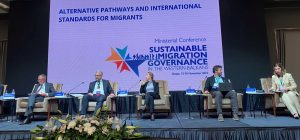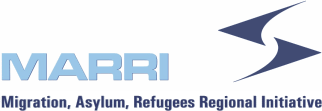 “The possible solution to the irregular migration could be harnessing the potential of migrants arriving in the Western Balkans”. This is what Sashko Kocev, Director of the Migration, Asylum, Refugees Regional Initiative (MARRI) Regional Centre said at the Ministerial Conference “Sustainable Migration Governance in the Western Balkans” organized by IOM, and co-hosted by the Ministry of Interior of North Macedonia and the Czech Ministry of the Interior, under the auspices of the Czech Presidency of the Council of the European Union. The two-day high level conference aimed to identify comprehensive, sustainable and solutions-oriented approaches for effective migration management in the Western Balkans.
“The possible solution to the irregular migration could be harnessing the potential of migrants arriving in the Western Balkans”. This is what Sashko Kocev, Director of the Migration, Asylum, Refugees Regional Initiative (MARRI) Regional Centre said at the Ministerial Conference “Sustainable Migration Governance in the Western Balkans” organized by IOM, and co-hosted by the Ministry of Interior of North Macedonia and the Czech Ministry of the Interior, under the auspices of the Czech Presidency of the Council of the European Union. The two-day high level conference aimed to identify comprehensive, sustainable and solutions-oriented approaches for effective migration management in the Western Balkans.
Director Kocev, as a panelist in the session “Alternative Pathways and International Standards for Migrants” reminded that the Western Balkan is traditionally a region of origin of migrants to Western Europe or further, and that this trend continues even today on a larger scale. With the highest emigration rates in Europe, the Western Balkans face a range of economic and social consequences because of people leaving to find a better life abroad. What is more, young and well-educated people are the most represented group among emigrants, leaving behind both shortages and surpluses of labour for different skill groups. The numbers of emigrants to total population varies largely between the MARRI Participants, informed Director Kocev, ranging from 49% in Bosnia and Herzegovina, 44% in Albania, 34% in North Macedonia and 30% in Kosovo* to 21% in Montenegro and 15% in Serbia. Тhe RCC Balkan Barometer from 2021, revealed that 37.3% of 6000 respondents, were considering living and working abroad. As a result, the discrepancy between the increased number of vacancies and the decreased number of populations is becoming apparent, said Director Kocev. The Chambers of Commerce in the region were already sounding the alarm about the need for adequate workforce, while the people living in the region felt the consequences of the emigration through the shortages of doctors, nurses, builders, farmers, etc. The positive outlook was that in the past decade, four Western Balkans became candidates for EU accession and in that direction the legislation relating to migration was largely harmonized with the European one. “I believe that it is high time, following the example of the developed countries of Western Europe, that the Western Balkans administrations start developing immigration policies that would attract and retain migrants from economically less developed regions” said Director Kocev. For this to happen, a whole set of policies were needed for supporting the positive role that migration can play. Such policies included, regulating the legal status of migrants, efforts in education and training, cooperation agreements between source and host countries, and more generally, recognising the interrelationships between migration, human capital development, labour deployment and economic development. In policy terms, all MARRI Participants acknowledged the prominence of labour migration and initiated the design of corresponding institutional structures and strategies, albeit with a varying degree of success. Some have actively promoted regular channels of migration by renewing existing labour migration agreements and signing new ones with EU Member States as well as within the region. The next step should be assessing the future economic performance and particular sectors, driving GDP growth, thereby defining the specific demand for labour and skills. Except for lack of, or lack of knowledge about the procedures, other factors should be considered, said Director Kocev, such as institutional capacities, intra-institutional coordination and cooperation, local communities, etc. Another important aspect was that the efforts to establish regular pathways for labour migration, will drastically reduce the smuggling, trafficking in humans and the labour exploitation of the migrants. At the end, Director Kocev draw the attention to the dominant negative public narrative about the migrants. Prejudices such, “migrants are bringing crime and terror in the new countries”, they are “low-skilled”, “steal jobs” and “undermine the welfare systems” in the host countries, or the typical gender stereotype that ‘different’ men are “dangerous ” are serious concern, and have an immense impact on the security and resilience of the societies. Contrary to this discourse, he pointed out, Europe’s population projections show a dramatic trend of decrease and ageing that, in the absence of immigration, will cause unsustainability of its welfare systems. “I would like to emphasize the importance of the professional and academic discussions on all migration-related issues, because only with evidence-based approach, the region can develop comprehensive and sustainable policies on migration” concluded Director Kocev.
